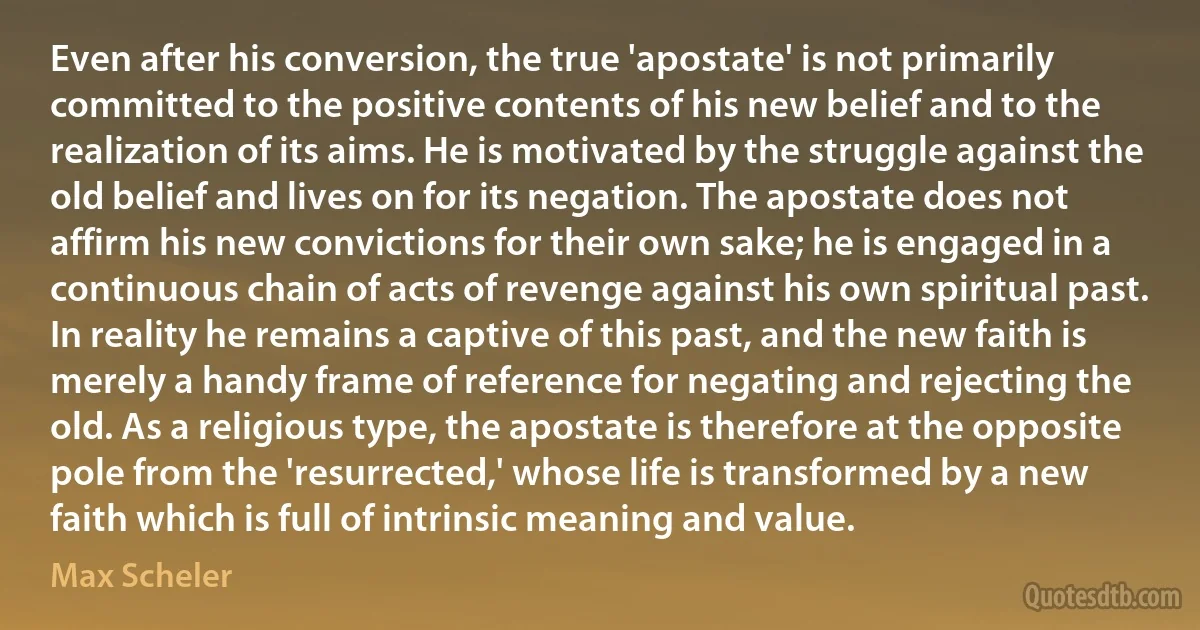
Even after his conversion, the true 'apostate' is not primarily committed to the positive contents of his new belief and to the realization of its aims. He is motivated by the struggle against the old belief and lives on for its negation. The apostate does not affirm his new convictions for their own sake; he is engaged in a continuous chain of acts of revenge against his own spiritual past. In reality he remains a captive of this past, and the new faith is merely a handy frame of reference for negating and rejecting the old. As a religious type, the apostate is therefore at the opposite pole from the 'resurrected,' whose life is transformed by a new faith which is full of intrinsic meaning and value.
Max SchelerRelated topics
apostate chain commit conversion faith frame full intrinsic lives life meaning past realization revenge sake value remains actsRelated quotes
The voice in my soul in which I will have faith, and for the sake of which I have faith in all else, does not merely command me generally to act, but in every particular situation it declares what I shall do and what leave undone; it accompanies me through every event of my life, and it is impossible for me to contend against it. To listen to it and obey it honestly and impartially, without fear or equivocation, is the business of my existence. My life is no longer an empty I play without truth or significance. It is appointed that what I conscience ordains me shall be done, and for this purpose am I here. I have understanding to know, and power to execute it. By conscience alone comes truth and reality into my representations.

Johann Gottlieb Fichte
We wouldn't attempt to meditate, or engage in any other contemplative practice, if we didn't feel that something about our experience needed to be improved. But here lies one of the central paradoxes of spiritual life, because this very feeling of dissatisfaction causes us to overlook the intrinsic freedom of consciousness in the present. As we have seen, there are good reasons to believe that adopting a practice like meditation can lead to positive changes in one's life. But the deepest goal of spirituality is freedom from the illusion of the self-and to seek such freedom, as though it were a future state to be attained through effort, is to reinforce the chains of one's apparent bondage in each moment.

Sam Harris
Within the scientific skeleton of truth, religious meaning attempts to flourish, often by denying the scientific framework itself-rather like sawing off the branch where you cheerily perch. The disgust is mutual because modern science gleefully denies virtually all the basic tenets of religion in general. According to the typical view of modern science, religion is not much more than a holdover from the childhood of humanity, with about as much reality as, say, Santa Claus. Whether the religious claims are more literal (Moses parting the Red Sea) or more mystical (religion involves direct spiritual experience), modern science denies them all, simply because there is no credible empirical evidence for any of them.

Ken Wilber
[I was] a youth in his twenty third year, young of his age, who had seen little or nothing of the world, who resigned himself to politics, but whose desire had been for the ministry of God. The remains of this desire operated unfortunately. They made me tend to glorify in an extravagant manner and degree not only the religious character of the State, which in reality stood low, but also the religious mission of the Conservative party. There was, to my eyes, a certain element of AntiChrist in the Reform Act and that Act was cordially hated. ... It was only under the (second) Government of Sir Robert Peel that I learned how impotent [and] barren was the conservative office for the Church.

William Ewart Gladstone
There is nothing enduring, permanent, either in me or out of me, nothing but everlasting change. I know of no existence, not even of my own. I know nothing and am nothing. Images - pictures - only are, pictures which wander by without anything existing past which they wander, without any corresponding reality which they might represent, without significance and without aim. I myself am one of these images, or rather a confused image of these images. All reality is transformed into a strange dream, without a world of which the dream might be, or a mind that might dream it. Contemplation is a dream; thought, the source of all existence and of all that I fancied reality, of my own existence, my own capacities, is a dream of that dream.

Johann Gottlieb Fichte
